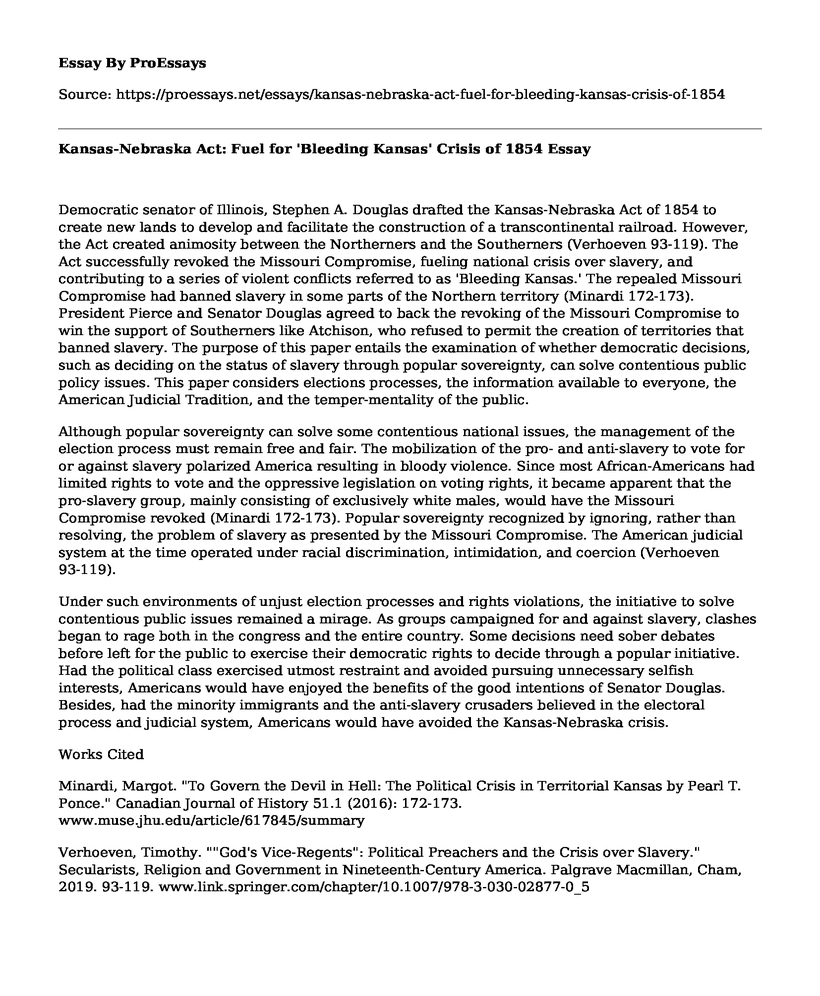Democratic senator of Illinois, Stephen A. Douglas drafted the Kansas-Nebraska Act of 1854 to create new lands to develop and facilitate the construction of a transcontinental railroad. However, the Act created animosity between the Northerners and the Southerners (Verhoeven 93-119). The Act successfully revoked the Missouri Compromise, fueling national crisis over slavery, and contributing to a series of violent conflicts referred to as 'Bleeding Kansas.' The repealed Missouri Compromise had banned slavery in some parts of the Northern territory (Minardi 172-173). President Pierce and Senator Douglas agreed to back the revoking of the Missouri Compromise to win the support of Southerners like Atchison, who refused to permit the creation of territories that banned slavery. The purpose of this paper entails the examination of whether democratic decisions, such as deciding on the status of slavery through popular sovereignty, can solve contentious public policy issues. This paper considers elections processes, the information available to everyone, the American Judicial Tradition, and the temper-mentality of the public.
Although popular sovereignty can solve some contentious national issues, the management of the election process must remain free and fair. The mobilization of the pro- and anti-slavery to vote for or against slavery polarized America resulting in bloody violence. Since most African-Americans had limited rights to vote and the oppressive legislation on voting rights, it became apparent that the pro-slavery group, mainly consisting of exclusively white males, would have the Missouri Compromise revoked (Minardi 172-173). Popular sovereignty recognized by ignoring, rather than resolving, the problem of slavery as presented by the Missouri Compromise. The American judicial system at the time operated under racial discrimination, intimidation, and coercion (Verhoeven 93-119).
Under such environments of unjust election processes and rights violations, the initiative to solve contentious public issues remained a mirage. As groups campaigned for and against slavery, clashes began to rage both in the congress and the entire country. Some decisions need sober debates before left for the public to exercise their democratic rights to decide through a popular initiative. Had the political class exercised utmost restraint and avoided pursuing unnecessary selfish interests, Americans would have enjoyed the benefits of the good intentions of Senator Douglas. Besides, had the minority immigrants and the anti-slavery crusaders believed in the electoral process and judicial system, Americans would have avoided the Kansas-Nebraska crisis.
Works Cited
Minardi, Margot. "To Govern the Devil in Hell: The Political Crisis in Territorial Kansas by Pearl T. Ponce." Canadian Journal of History 51.1 (2016): 172-173. www.muse.jhu.edu/article/617845/summary
Verhoeven, Timothy. ""God's Vice-Regents": Political Preachers and the Crisis over Slavery." Secularists, Religion and Government in Nineteenth-Century America. Palgrave Macmillan, Cham, 2019. 93-119. www.link.springer.com/chapter/10.1007/978-3-030-02877-0_5
Cite this page
Kansas-Nebraska Act: Fuel for 'Bleeding Kansas' Crisis of 1854. (2023, May 30). Retrieved from https://proessays.net/essays/kansas-nebraska-act-fuel-for-bleeding-kansas-crisis-of-1854
If you are the original author of this essay and no longer wish to have it published on the ProEssays website, please click below to request its removal:
- New Lease Standards
- Essay on Christian Traditions and Principles
- Essay on the Unrewarded Labor of African Americans: A Trace of Economic History
- Is Poverty a Crime? Examining Barbara Ehrenreich's NYT Piece
- TDV: Teen Dating Violence Prevalence and Impact - Essay Sample
- Essay Sample on Hart-Cellar Act 1965: Reuniting Families & Attracting Skilled Labor
- Essay on Dorothy Dandridge: Pioneering Black Actress, Singer, Dancer in Face of Racism







